Do you practice yoga breathing? Though we associate yoga most with asanas (poses), pranayama (breathing) is just as an integral part of yoga. Pranayama is practiced for the health of both mind and body. According to B.K.S. Iyengar, “evenness of breathing leads to healthy nerves and so to evenness of mind and temper.” We have all felt the shortness and shallowness of breath when under extreme stress or fatigue. With its deliberate steps, Pranayama cues your body and mind to restore its calm.
A senior devotee at the Krishna Consciousness temple I attended for years in California decided to get on the floor after we ate prasadam (holy food) and show some yoga breathing practices to my niece, nephew, mother in-law, and me. Nadi Shodhan is especially good for your digestion, respiratory, immune and endocrine systems, your overall health and longevity. B.K.S. Iyengar distinguished this pranayama as the one exercise that should be practiced daily.
1. Nadi Shodhan Pranayama (About 4.5 minutes)
This exercise uses alternating breathing through the nostrils for 9 rounds of breath.
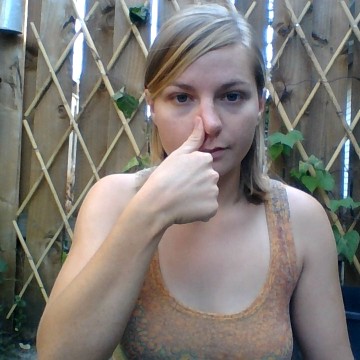
Step 1: Use your right thumb to plug your right nostril.
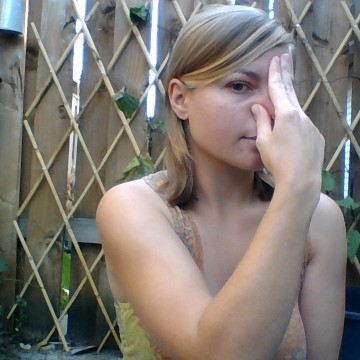
Step 2: Place your index and middle finger on your forehead.
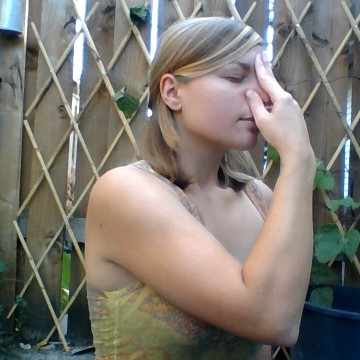
Step 3: Close your eyes and inhale through your uncovered left nostril.
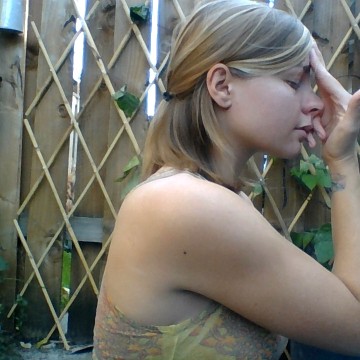
Step 4: With knuckles of your ring and pinky fingers plug your left nostril and lift your thumb from your right nostril. Exhale completely through your right nostril.
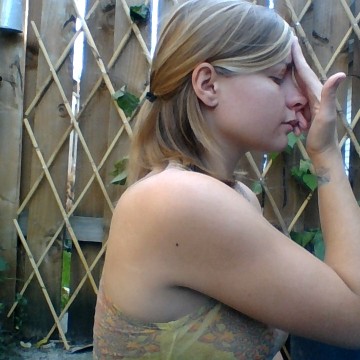
Step 5: Still covering your left nostril, inhale through your right nostril.

Step 6: Cover your right nostril with your thumb, release left nostril and exhale through left nostril.
Repeat this sequence for a total of 9 rounds. As you do this the breaths you are able to take become deeper and more full, bringing more benefits to your body and mind the further into the exercise you get.
If you visualize the movement of breath in this motion, it’s kind of like a roller coaster. It’s as if the still third eye is watching the up and down waves of life move through you.
2. Wind Removing Breath (About 8 minutes)
My Mom and Grandma used to watch Kathleen Hitchcock together. She was a Yogi with a 30 minute show on PBS in the ’70s. That same decade Mom spent 2 years living in an Eastern Philosophy Community, the Arica Institute where meditation and yoga were practiced daily. She started teaching me yoga practice when I was 12 years old. “Yoga is really about the breath,” she told me.
This breathing exercise uses Wind Removing Pose in 4 sets. The first set uses 12 breaths on each side, the second set 9, the third set 6 and the fourth (last) set 3 breaths. Inhales in this exercise correspond with the leg that is folded up knee towards shoulder, exhales are associated with the leg that is lying out flat with a flexed foot.
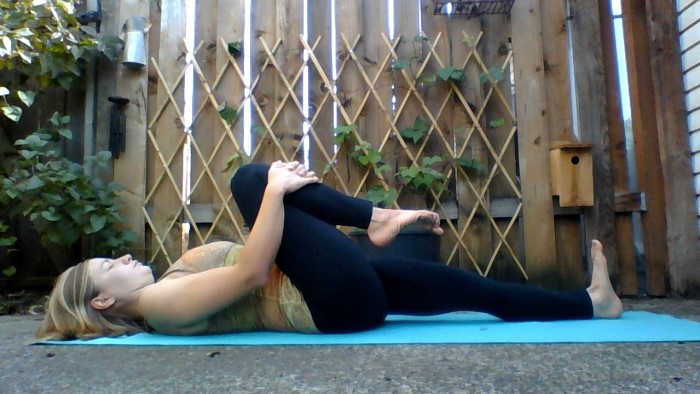
Set 1: Pull your right knee towards your chest and shoulder and lie left leg out flat with a fully flexed foot. On the deep inhale gently and slowly pull your knee in subtly closer to your shoulder and hold it closer until the exhale brings it back to a comfortable place. On the exhale push your fully flexed foot down in the opposite direction from the pull of your bent knee creating a nice counter stretch between your hips and legs as well as feet and shoulders. Each inhale/exhale is one full breath. Repeat for 12 breaths.
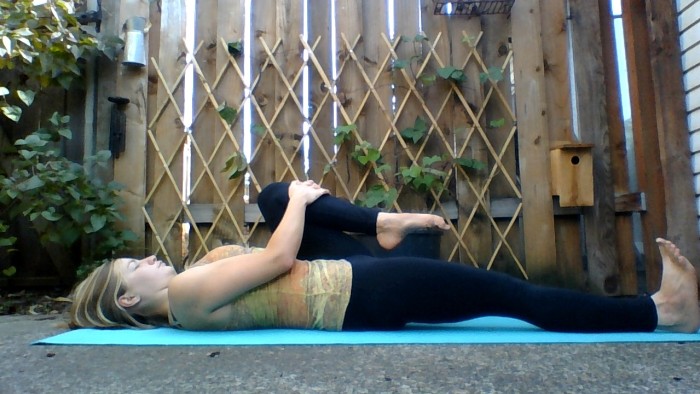
Switch sides (left knee towards chest and shoulder and right leg lying flat with flexed foot) and repeat for 12 more breaths.
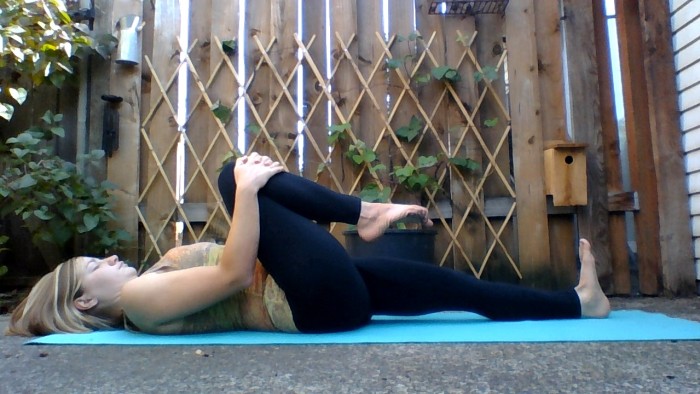
Set 2: Take 9 deep breaths with each vertebrate of your spine fully engaged with the mat as much as possible, your chin pulled towards your chest, shoulders relaxed toward the mat as much as possible. Be conscious of the tendency to lean your entire body and vertebrate towards the side of your mat with the bent knee. Keep your torso and vertebrate straight and centered in this pose, as if someone was pulling a string taught that goes through the center of your body.
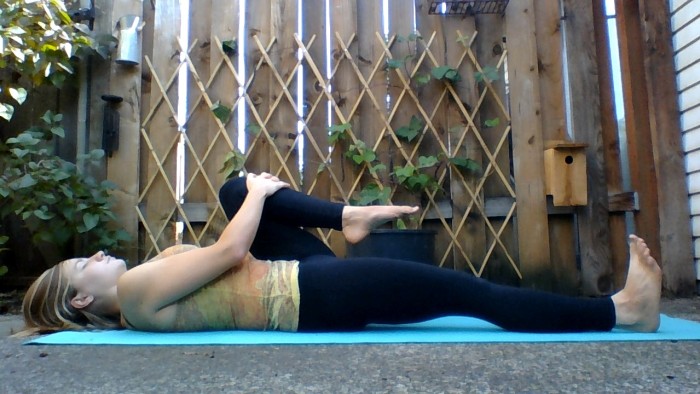
Set 3: Wind-removing Inhale and Exhale for 6 breaths. Each inhale is a gift of wind towards your mind, each exhale wind is a gift towards the Earth you walk across.
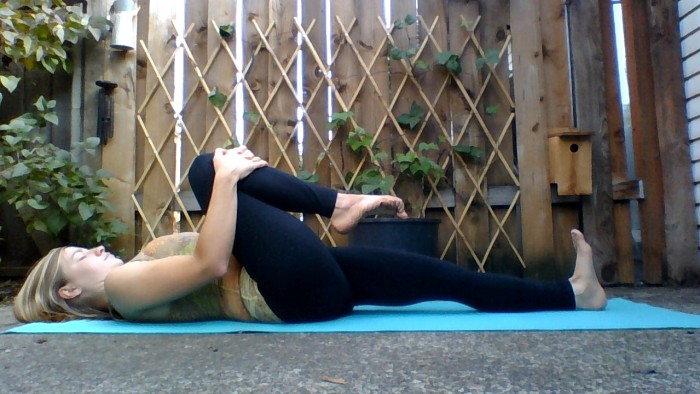
Set 4: Wind-removing Inhale and Exhale for last 3 breaths.
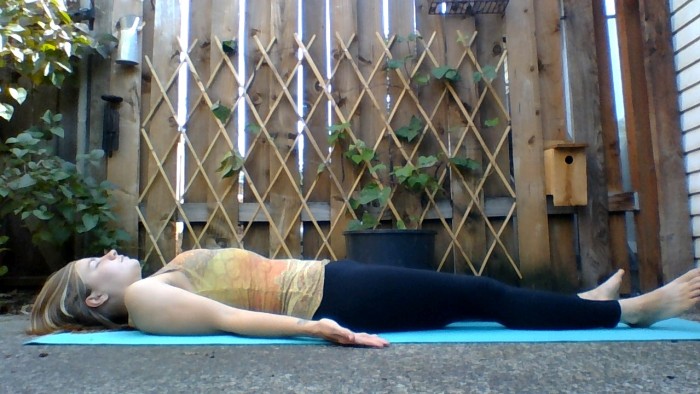
Lie in corpse pose, feeling your vertebrate, your limbs your breath on the ground all at once and take several breaths feeling the effects of what you just did for your body.
3. Lion’s Breath (About 50 seconds)
Sitting on your knees, feet comfortably tucked beneath your bottom, place your hands on your knees.

Inhale slowly. Fully fill your lungs with air.
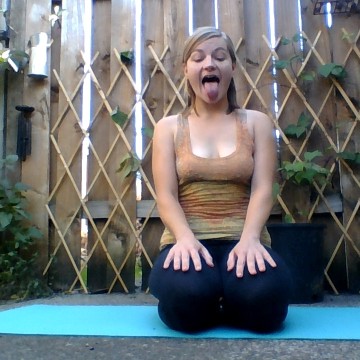
Exhale fully with your tongue out towards the bottom of your chin as far as it will stretch. Imagine yourself as a lion with a fully alert and large mane. Let energy roll off your face, off the tip of your tongue, off the tip of your fingers, out the hairs of your mane. With wide open eyes you may also focus your gaze to the end of your nose during the exhale, which looks funny:
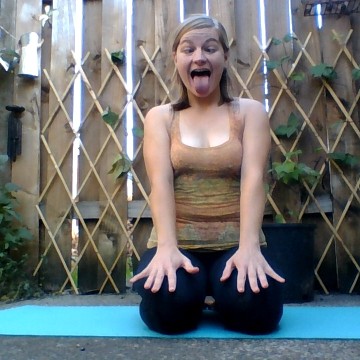
It also adds an extra element to the exhale breath, as you watch your breath leave your body, imagining excess thoughts are leaving your consciousness through your third eye rolling out of you right off the tip of your nose. Repeat 5 times.
More yoga breathing: 4 Kundalini Yoga Poses for Calm and Relaxation
Yoga Breathing Exercises for Self-Soothing
Get more like this–sign up for our inspirational newsletter for exclusive content!
__
Photo: Alyse Toulouse




